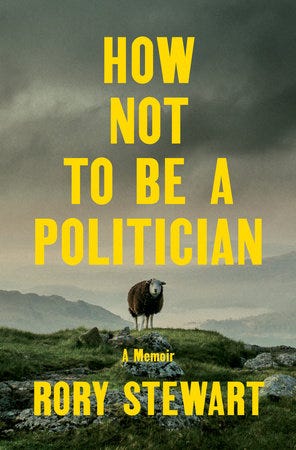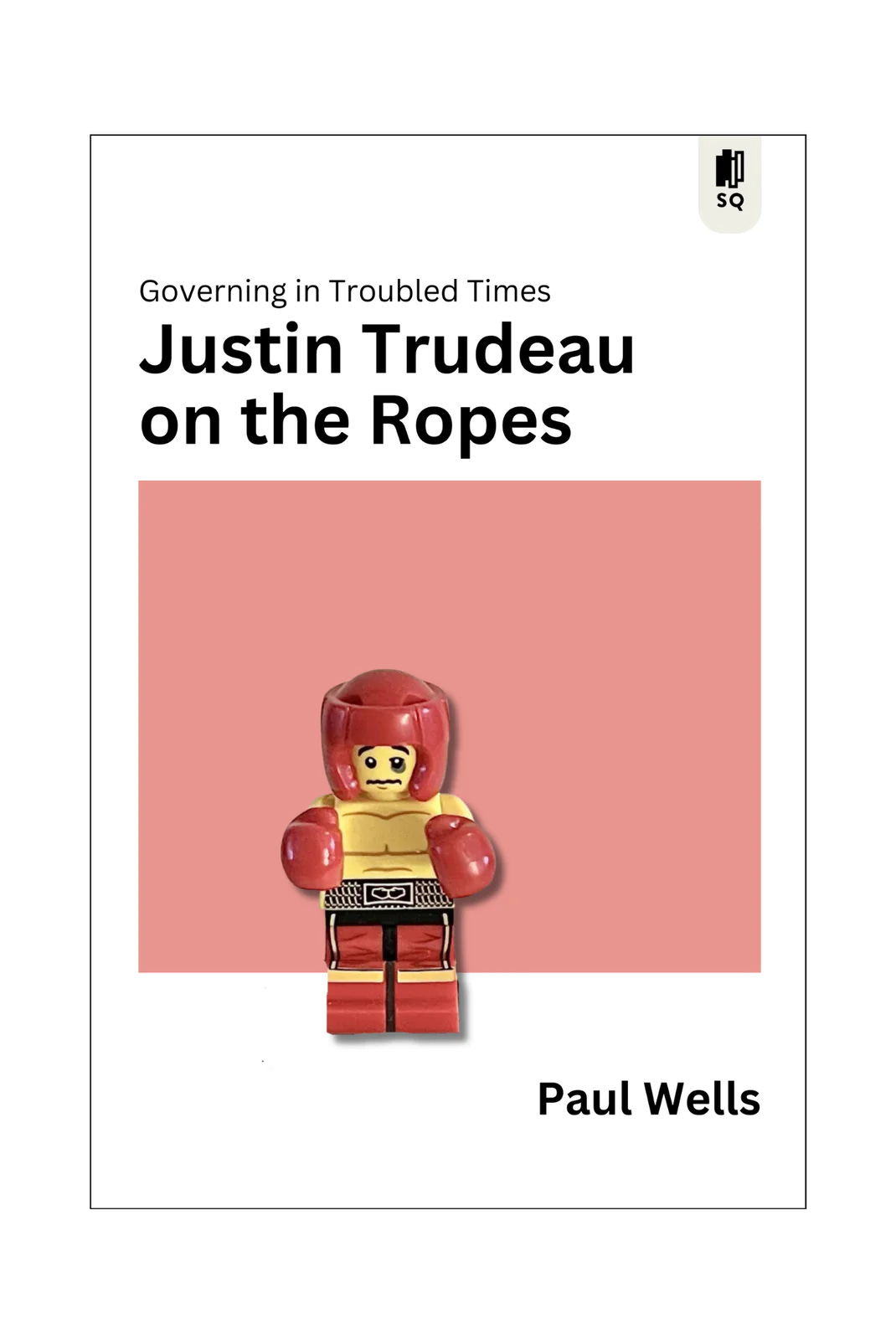Today we’ve got a year-end list of books and music I liked, along with tips for making sure the person you love has the maximum possible exposure to the writing of Paul Wells. In the spirit of the season, you understand.
First a bit of housekeeping.
1. Monday Night is Paul Wells Show Show Night!
Barely a day after paying subscribers received invitations to next Monday’s live recording session for The Paul Wells Show, featuring guests Shuv Majumdar, Larisa Galadza, Caity Gyorgy and Jason Guriel, far more of you had signed up than we have room for. This is a fantastic response. I’m grateful for the interest.
That much interest also generates crowd-management challenges for our hosts at the National Arts Centre. It’s especially difficult because, often, when people sign up for free tickets, they don’t show up to use them. Which could lead to a situation where people who could have used the tickets stay home, while seats sit empty without anyone in them to enjoy the show.
So I want to start with this request to people who signed up for tickets, received confirmation, but can’t go. If you’re one of those people, please send a note to invitation@nac-cna.ca and let them know you’re liberating your seats. That way the organizers can pass your tickets on to somebody who can use them.
If this is the first you’re hearing about the event — a situation most of my free subscribers are in — I’m afraid we’ve got a full house. But (a) the complete proceedings of Monday night’s show will be recorded for the next episode of my podcast, which will be released next week and will be highly entertaining; (b) we will certainly do live events like this again, and not only in Ottawa.
I’m so glad we’ll have a big crowd on Monday. Please do let the NAC know if you can’t make it. It will make a big difference to the next person on the waiting list.
2. 2023 In Books. Well, Actually, Book.
I make no claim to authority in literature. I spend too much time reading for work and not enough for pleasure. But readers sometimes ask what I would recommend. Here’s my best answer this year.
I was surprised by Rory Stewart’s political memoir, How Not to be a Politician. As I expected, it’s a great pleasure to read, but I’ve come to see it as an important book for anyone trying to understand today’s politics, very much including Canadian politics. I might even do a book club on it if enough of you are interested. Stewart is an oddball upper-class fellow who got famous for walking across Afghanistan and writing a book about it. He wandered into electoral politics in 2010, taking the new UK Conservative leader David Cameron at his word when Cameron said he wanted new recruits from outside politics. He was ejected from the Conservative Party nine years later, having crossed Boris Johnson. These days he makes podcasts.
At first How Not to be a Politician (which had a different title and cover in the UK) seems like an extended humblebrag, in which a smart fellow finds new work and discovers that nobody at work is smart. Stewart avoids being insufferable by cheerfully admitting that he, too, is often wrong about things. But along the way he depicts a world in which just about everyone is bluffing, and not well either. Indeed it’s a world where anyone who puts any effort into understanding the field in which they’re operating — rural broadband or international development or prisons, to name three of Stewart’s briefs — is viewed by colleagues as almost certainly more trouble than they’re worth.
It’s a world in which everyone, from junior officials up to prime ministers, is helpless and resigned to being helpless. A few excerpts might give the flavour. On Liz Truss, who would later go on to be prime minister for 49 days:
I was told that she had been promoted faster than anyone because she was a ‘strong media performer.’ Intrigued by this, I had watched a number of her interviews. In none of them had she reflected, apologised, explained, empathised, or attempted to persuade. Nor did she ever, except in the rarest cases, answer a question. Instead, she approached interviews as broadcasts: opportunities to repeat the party attack line, never giving ground, or varying her tone.
‘I want you to write a ten-point plan for the national parks.’
‘Yes, Secretary of State,’ I said… ‘I will get straight out to visit the parks, then we will get the heads of the national parks down. I will have a plan ready for you within four weeks.’
‘You have three days, Rory,’ she said with such exaggerated firmness that I wondered if she were joking. ‘We need to get it into the Telegraph on Friday.’
On the secrets of Truss’s success:
Governing might be about critical thinking; but the new style of politics, of which she was a leading exponent, was not. If critical thinking required humility, this politics demanded absolute confidence: in place of reality, it offered untethered hope; instead of accuracy, vagueness. While critical thinking required scepticism, open-mindedness and an instinct for complexity, the new politics demanded loyalty, partisanship and slogan: not truth and reason but power and manipulation.
On Boris Johnson, whom Stewart comes to see as a monstrous figure:
He was looking, he said, for ‘wins’. ‘And Libya,’ he suddenly added, ‘that’s a bite-size problem. A good British-size problem, Rory. We should sort out Libya.’
…I explained that Libya was another minister’s brief. [Johnson, as senior foreign secretary] had only given me sub-Saharan Africa. And it was worth remembering that we didn’t have a resident embassy in Libya…. But if I expected him to engage or ask a couple of questions about the details, I was to be disappointed.
‘Come on Rory,’ he replied, ‘you can do it. Libya!’
In international development, one of the few assignments in which he has any pre-existing expertise, Stewart finds himself openly challenged and even ignored by his departmental officials, on the plain assumption that if they can stonewall him for long enough, he’ll be shuffled somewhere else and they won’t have to worry about him. This is indeed what happens. The betrayals he suffers from colleagues during the party leadership race are somehow less unnerving than this: the sense that political leadership is less than cosmetic, that the way to succeed in politics is to stop worrying about how helpless you are to change anything. I laughed hard every few pages through this book, but it will haunt me for a long time.
3. Give your Loved Ones the Gift of Me
Readers sometimes ask whether they can give gift subscriptions to friends and family. You sure can! Follow this link to a page where you can subscribe for friends on the same terms you subscribed for yourself. You can send them a merry message or schedule the subscription to start at a moment of your choosing. It’s also possible to take out a group subscription, for everyone in your office or friend group. Gift rates are the same as other subscriptions. Incidentally, when I look at what other people are charging for their newsletters, I see most are charging more than I am. I’ll be boosting my rates in 2024, though not for a while. Not while there’s snow on the ground in Ottawa, I’d say. But subscribing now ensures a good price.
4. 2023 in Music
Here’s a longer list of music I liked. Stuff you’re likelier to have heard of near the top.
Bleachers, Live at Radio City Music Hall
New Jersey’s Jack Antonoff is living the life, producing Lana Del Rey and Time magazine’s person of the year, marrying Margaret Qualley. He also released a live concert album this year (streaming only) in his capacity as the lead singer of Bleachers. There can be a few reasons for making live albums. One is to make it clear you have a fantastic set list and a force-of-nature stage presence. That’s what this one did for me. Bruce Springsteen shows up for a song, long after it’s clear that Antonoff likes to endlessly recombinate the elements of Springsteen’s music. Triumphant anthems about being sad are on offer, one after another, and if it’s pastiche, which it sure is, it’s pastiche of a very high order.
Zeus, Credo
Snake Plissken? I heard you were dead. It’s nearly a decade since this Toronto band, who used to work as Jason Collett’s backup band, released an album. Turns out they’ve spent the intervening years digesting the influences that used to make them sound like an unapologetically goofy tribute to ’70s album rock and glam pop — Elton John, Queen, Emerson, Lake and Palmer. Now they sound less eccentric and more internally coherent. And it’s not as though listening to all those great old tunes was a bad idea.
Benjamin Dakota Rogers, Paint Horse
He’s a singer-songwriter from Mt. Pleasant, ON, just outside Prince Edward County. He has been making a name on TikTok. He tours nearly constantly, mostly in the U.S., though he’ll start in Vancouver and end in Montreal in February and March. His new album is stripped down and etched in acid. Rogers’s voice is a thing of terrible stark revelation.
Doxas Brothers, Kindred
The brothers from Montreal — Jim Doxas on drums, Chet Doxas on saxophones and living these days in Brooklyn — continue to refine their vision for a jazz quartet with a quietly obstinate individuality. On their second album in this configuration after countless sessions in other bands, with veteran American pianist Marc Copland, they sound like they’ve heard all of modern jazz’s great small ensembles — Miles Davis’s second quintet, John Coltrane’s quartet, Keith Jarrett’s American quartet — but they’re not particularly interested in imitating them. The four-way empathy and the brazen dismissal of anything resembling cheap displays of dexterity are something to behold. Special mention to bassist Adrian Vedady, who’s mixed prominently enough so you can hear how many of the band’s best ideas come from him.
Cécile McLorin Salvant, Mélusine
At 34, it’s clear that this insightful singer, born in Florida to a Haitian father and French mother, is becoming one of the leading forces in jazz. Except the genre label is an increasingly approximate fit: there is as much cabaret and musical theatre in her performances as jazz. On Mélusine she mostly sings in French and languages of the extended French diaspora. She sings with tremendous intention and weight. You find yourself thinking about her performances later. Her partner, pianist Sullivan Fortner, whose own new solo album is getting a lot of close attention, anchors a superb rotating cast of accompanists.
Jason Moran, From the Dancehall to the Battlefield
A leading pianist’s sprawling tribute to James Reese Europe, a composer and bandleader who was an important precursor to jazz, including with the Harlem Hellfighters in World War I. Moran spends little time on overt recreation of Reese’s music, preferring to use it as the setting for references to later styles. The whole thing is bookish, epic, and much more entertaining than that sounds.
Arturo O’Farrill, Legacies
The bandleader who inherited command of his father’s Afro-Latin Jazz Orchestra delivers one of the year’s most astonishing jazz piano albums. Alone and with a trio (Liany Mateo on bass, Zack O’Farrill on drums, both ably fielding anything the leader throws at them), he delivers a dense, two-fisted survey of standards and obscurities, which he dismantles and re-imagines on the fly. The precedents that came to mind as I listened are dizzying — it takes a lot for me to reach for comparisons to Duke Ellington’s Money Jungle, but this is definitely a lot.
Dan Tepfer, Inventions/ Reinventions
French-American pianist tackles — and complements — Bach. The greatest composer, you see, wrote two-part inventions (interlocking lines for left and right hand) for solo piano in 15 major and minor keys. Which meant there were nine keys that he left out. Tepfer plays Bach’s pieces in order, and when he gets to a key Bach didn’t address, Tepfer improvises something new. He makes no effort to sound like Bach, but he comes up with imaginative and beguiling things to play. As a bonus, he’s also a solid Bach pianist. The whole thing is a fresh angle on the connected burdens of study and creation.
St. John — Mercer — Park Trio: Kevin Lau: Under a Veil of Stars
It’s not often, to understate things, that an album of chamber music by a Canadian composer spends a lot of time on my home stereo. Here’s an exception. Ottawa-based composer Kevin Lau pays close attention to melody and texture on a program of duets and trios. The results, by turns somber and gorgeous, reward close attention for more than 80 minutes. It helps that the players on hand, including NAC Orchestra principal cellist Rachel Mercer, are so dedicated to the material.
5. Maybe Don’t Walk in the Snow Just Yet, Big Guy
I’m writing another instalment in Sutherland House’s acclaimed Sutherland Quarterly series of short books. You can subscribe, for the pleasure of receiving a new volume on a new topic in current affairs from a different author every three months, here. The cover is perhaps self-explanatory:
The blurb, which publisher Ken Whyte had me write quickly to meet a marketing deadline, I think still basically holds up:
The worst decade in the history of the Liberal Party of Canada came to an end on October 19, 2015. Justin Trudeau swept to power, ending the ten-year rule of Stephen Harper’s Conservatives. Trudeau’s vision was relentlessly optimistic: the word "positive" was heard eight times in his victory speech, along with references to "sunny ways" and "hope and hard work." But the fates decreed that he would govern in darker times. His rookie government, itself mainly staffed by rookies in federal politics, had to learn on the job in an age of polarization, misinformation, and pandemic, while dealing with the rise of Trump and Brexit, a newly belligerent China, and wars in Ukraine and the Middle East. The moment needed more than a young PM's abundant charm. And almost from the outset, Trudeau struggled to rise to the occasion.
A decade after he published The Longer I’m Prime Minister, the definitive portrait of Stephen Harper in power, Paul Wells, one of Canada’s all-time great political writers, turns his attention to Justin Trudeau, a man of talent, ambition, and trust issues in a time of mistrust.
Despite the frisky cover design, I want this to be a serious attempt to assay the PM’s near-decade in power so far. Publication date is May 7. You can pre-order here.






Paul,
Just a huge thank you. This has literally made my day as I wander through the selections, adding some to my streaming service and thinking about Christmas list adjustments.
Merry Christmas to you and your family!
Couldn't agree more with recommending Kevin Lau's album. My own appreciation after the Chamberfest concert last week: https://erwindreessen.substack.com/p/lau-and-ravel.